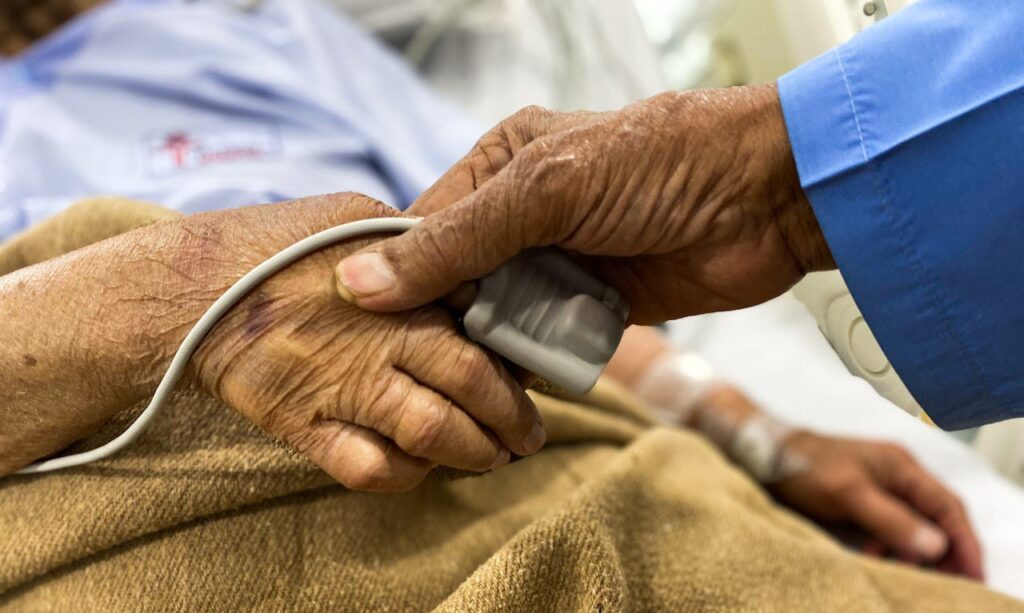
Healthcare settings, like hospitals and care homes, are filled with trained staff. These environments are designed to support your loved one. Some will help the senior recover from injury and illness, while others will support them in the later stages of their life.
These are the places you turn to when your loved one needs help that you can’t provide. And, they truly are amazing – most of the time.
However, this doesn’t mean that you should be hands off. There are some crucial reasons why you should stay on alert and be an advocate for a senior advocate for your loved one. Doing so might even save their life.
Why You Must Be the Senior’s Advocate
Facilities Are Often Short-Staffed
Healthcare facilities are often short-staffed, sometimes incredibly so. As a result, the staff members who are present often have high workloads and are rapidly moving between patients.
It’s incredibly easy for things to get missed in this environment.
Subtle signs that a senior is struggling, depressed, or in pain could easily get overlooked as staff move between patients.
Even when there aren’t any health problems, some seniors may need more time and connection than is available.
And, that’s on a good day.
Short-staffing becomes a particularly big issue when there’s an emergency. It becomes difficult for nurses and other medical staff to reach patients as fast as is needed.
Staff May Be Stressed
Healthcare is a tough field. Staff may be working long days with many practical and emotional demands. You’ve probably been in that position yourself as a caregiver.
It’s no surprise that healthcare staff are often stressed and frazzled. Estimates even suggest that between 35% and 54% of nurses experience burnout. The rates vary between different locations and healthcare professions, but tend to be high regardless.
After all, caring roles come with high emotional and physical demands. It’s difficult to keep up with these day after day, year after year.
Stress and emotional overwhelm aren’t great in any caregiving situation. They can lead to short tempers, rapid judgment calls, and poor decisions.
The staff members themselves aren’t to blame here. They’re doing the best they can in a difficult situation. But, the point remains that stress can lead to mistakes and mistakes can cause health issues.
Staff Turnover
High levels of stress also mean that facilities often deal with considerable staff turnover.
This means there are new staff members learning the ropes regularly, while also getting to know new residents. The effect quickly increases the risk of mistakes.
This turnover can be distressing for residents too, particularly in long-term facilities. There’s often a sense of safety and familiarity in seeing the same people each day. Regular staff changes can have the opposite effect, perhaps leading to stress and anxiety.
There Could Be Policy Issues
Many healthcare facilities don’t have plans in place for every situation. Or, their plans and policies may not match what you hope for. Unfortunately, you often won’t be aware of this unless you ask plenty of questions.
For example, some memory care facilities may use medications as a type of chemical restraint to help control difficult dementia behaviors.
Or, a facility may not have many plans for responding to seniors who refuse to eat or become aggressive. The lack of detailed guidelines means you don’t know how your loved one will be treated. Plus, staff members may be trying to figure it out as they go along, which can lead to poor decisions.
They Don’t Know Your Loved One Like You Do
This issue is particularly important for hospital stays and when your loved one first moves into a new facility.
While staff members may be highly trained and experienced, they don’t have intimate knowledge of your family member.
They don’t know your loved one’s quirks. How they behave when they’re in pain or what depression symptoms look like for them.
It takes staff members time and patience to learn the individual quirks of patients and adapt to them. Some places do this well, while others don’t at all. Regardless, such learning takes time and there may be gaps.
This process can get disrupted too, like when a staff member changes floors or leaves and is replaced by someone new.
Bad Things Can Happen
Regardless of how well staffed the facility is and the plans they have in place – bad things happen.
The official term is adverse events, which refers to unintended injuries that occur as the result of medical treatment, rather than the health condition itself.
These adverse events often relate to monitoring and daily care. They include examples like bed sores, falls, infections, medication side effects, and even death.
Sometimes these events happen because something is missed. Perhaps staff are busy and they don’t check on a senior as often as they should. Or, there’s an emergency somewhere else in the facility and staff members are spread thin.
Another situation is where decisions need to be made quickly. For example, a patient may have a rare allergy that the doctor misses because they don’t check the notes first.
There are also times where the signs of an issue may be subtle. If there aren’t sufficient systems in place, then problems like dehydration can be easily missed.
This is particularly true for dementia patients, who are vulnerable to dehydration and may not drink water even if a glass is left nearby.
Advocating for your loved one and being involved in their care won’t completely prevent such issues. But, you can decrease their likelihood. After all, you’re very familiar with your loved one and they’re (probably) the only patient you’re visiting. This gives you more time and energy to keep an eye out for all the little signs.
Doctors Don’t Always Get It Right
Finally, doctors don’t always have the correct diagnosis the first time. They may not make the best choice with medications or care plans either.
They’re doing the best they can, but human health is incredibly complex. The same set of symptoms can mean multiple things, conditions can present differently from one person to the next, and people vary in their responses to medications.
This means there’s a trial and error aspect to treatment.
How to Be an Advocate for a Senior

Make Sure You Have Legal Authority
First, be certain that you have legal authority to be informed about your loved one and to make medical decisions.
Without this authority, privacy laws will severely limit the information you can be given. This may mean you’ll need Power of Attorney or that your loved one needs to sign certain paperwork to allow you access to information.
You’ll also need to make sure that everyone has access to the relevant paperwork.
Ask Questions and Be Pushy (if needed)
Medical staff will sometimes tell you the bare minimum about your loved one’s diagnosis or treatment plan.
Perhaps they don’t want to burden you or think that the extra information isn’t helpful. But, to advocate for your loved one, it’s best to know as much as possible.
This means asking for as many details as you can get. You might need to get pushy if staff members are resistant. If you have legal authority, then you have the right to know all the details, so you can make the best decision for your loved one.
Make sure you ask about the potential side effects of any medications, along with alternative options. This is crucial, as some medications have serious side effects that sometimes get glossed over in conversations about treatment options.
Seek Advice
Rather than just taking one person’s word about treatment, ask around. Look for a second opinion and a third. You might even ask nursing staff whether they agree with the medication choices or run the decisions by a different doctor.
The advice might match what you were already told, but at least this way you know. That’s much better than being in the dark.
Sometimes there might even be an entirely different treatment path that you can take. For example, some patients may benefit more from lifestyle changes than from being on statins. Or they may be able to take a lower dose of medication than was originally prescribed.
Pay Attention To The Little Things
When you’re with your loved one, look for any signs that something is wrong. Indications of pain or anxiety are particularly relevant, especially if there is no obvious cause for distress.
Be sure to check your loved one’s catheter too, if one is being used. Catheters can become dislodged or may have been inserted incorrectly. Nursing staff should be checking this regularly, but an extra set of eyes doesn’t hurt.
Similarly, keep an eye out for bruising, bed sores, or any other signs of an issue. Bruising on the face or torso are particularly concerning, as most accidental bruising occurs on the extremities. Bruising on the face, torso, or genital area may be a sign of abuse.
Check Medications
Medications often come with side effects and can easily interact with each other.
Unfortunately, you can’t trust that the doctor will be aware of all the potential issues. They may also be biased towards particular medications, even if the one they choose isn’t necessarily the best fit.
Additionally, seniors are often prescribed medications by multiple people, such as hospital staff and different doctors. And, some of those medications may have been prescribed for off-label use. This pattern can mean that no single doctor fully understands the senior’s entire medication regime.
Because of these complexities, it’s important to always ask about the potential side effects, along with interactions between medications. Remember to check against possible allergic reactions as well, as these are sometimes missed.
If you don’t know why a given medication was prescribed – ask. Keep asking until someone can give you an answer. I mean, seriously, your loved one shouldn’t be taking a given medication if no one even knows why.
Learn What Is Truly Needed
This approach is most relevant to medications, but applies in other areas too.
Healthcare professionals often focus on medical recommendations, as this is their area of expertise. However, medication often isn’t the only approach. It might not even be the best one.
This is why it’s so important to seek other perspectives. Learn as much as you can about the different options and their implications, so you can make an informed decision.
Final Thoughts
Healthcare facilities can seem like safe spaces where your loved one will be well taken care of.
That’s the case most of the time. But, it’s incredibly important to be vigilant. Adverse events do happen and some families have even lost loved ones because of this.
Advance Planning Coaching
It’s never too early to think about the future. Kapok’s Advance Planning service can help you understand the process of advance care planning, including the paperwork involved and important areas to think about.

Leave a Reply